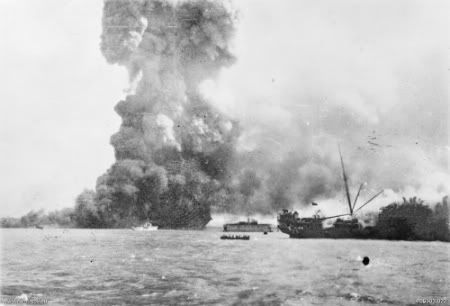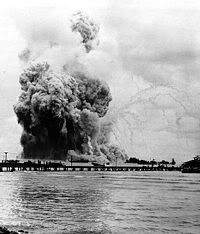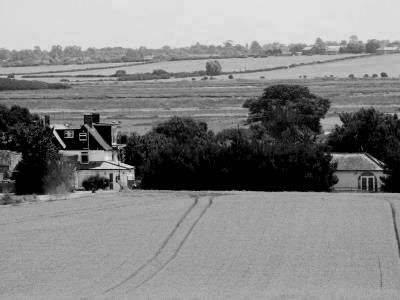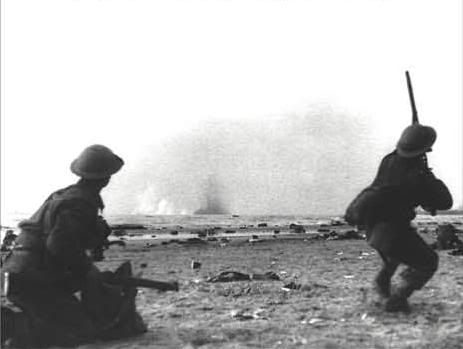Chapter III: Part XLI
Chapter III: The Lion’s Den
Part XLI
December 3, 1936
Just after 1015, the converted liner St. Louis passed through the breakwater of Dover harbor after a maddening eight hour run from Calais. As more than 5,500 men crowded to their assembly decks, the buzzer rang in Kuno-Hans von Both’s cabin.
“von Both.”
“We’re in harbor, Herr Generalmajor.”
“Thank you.” The commander of 2. Infanterie-Division cinched his life jacket straps and put on his helmet. His bags had already been taken by an adjutant. He took several steadying breaths and closed the cabin door behind him. It was a short climb to the weather deck.
The sight stretching out before the St. Louis caught him short. The clouds had parted and a beautiful pale blue sky stretched over Dover, stained only by thin ochre trails of smoke drifting up from several places within the city. The harbor was packed with transports of all varieties. von Both could see three other of the great liners, berthed along the center of the waterfront, and attended by numerous smaller boats. There were at least a dozen of the purpose-built troopships, moored near the inner harbor and even now disgorging thousands of men from their holds. Dock cranes unloaded many tonnes of stores and munitions from the holds of others. Picket boats were shuttling back and forth with equipment barges as the Kriegsmarine harbormasters in their yellow-painted launches tried to keep them from careening into other traffic. Ahead, two tugs were preparing to take the St. Louis to its assigned place on the east side of the harbor.
Over the ship’s loudspeaker, an officer’s voice called out debarkation orders. “Red units to red deck. Blue units to blue deck. Green units to green deck. Form up on your listed numbers. When the ship docks and your units are cleared, proceed to your colored rally points inland from the docks. Do not debark until your units are cleared. Red units to the red deck. Blue units to the blue deck...”
von Both looked over the rail, and could see hundreds of men milling around on the foredeck getting into order.
The tugs had secured their tow lines and were guiding the ship through a narrow lane in the busy harbor.
von Both looked out on what he could see of the seafront. Starting here, under the shadow of Dover Castle, he would lead his storied division to further glory up the road to London. This opportunity had been a long time coming. von Both was a proud Alsatian and a hardened Nazi -- dubious qualifications under old-order conservatives like Beck and von Fritsch, but in von Küchler’s HKK, his stock had risen considerably. His qualifications as an officer, at least, were beyond reproach. He had been a successful battalion commander in Flanders during the First World War, winning the Pour le Mérite and an enviable brace of knightly orders. But while the Blue Max and all the others were in his shore trunks, one single decoration was now pinned to the right breast of his combat tunic: the Blood Order. Inscribed, “...and they were victorious after all,” the silver medal was reserved for those whose loyalty to National Socialism dated back to the failed 1923 putsch. He would step onto English soil wearing the Blood Order alone.
As the St. Louis was towed toward its berth, von Both climbed down to the port boat deck deck to oversee the preparations for debarkation. Suddenly, he was in the midst of the common soldiers, each checking his rifle and helmet. The men were all in a great clamor.
It took a moment for von Both to realize that the sound was shouts of alarm, joined now by the steady bang of an antiaircraft gun. He pushed through the densely packed men and raced up a ladder back to the weather deck. Out over the city, he could see dark spots rapidly resolving into wings. Black splotches of flak appeared over the docks.
A booming pillar of water erupted just off the St. Louis’ bow, and he could see splinters raining down on the deck and into the surrounding water. A bright fireball appeared on the deck of a supply ship across the harbor, the sound of the explosion reaching him a moment later. With a clattering roar, a biplane passed low over von Both’s head.
He spun around. RAF roundels. Looking back toward the city, there were dozens of planes passing out over the harbor toward him. More fireballs bloomed on the docked ships and along the waterfront. von Both locked eyes on one of the biplanes, craning his neck to follow it as a bomb separated from its belly and tumbled into the superstructure of a nearby troopship. He could see men and parts of men thrown violently into the air and disappearing in the smoke and flame.
One after another, enemy biplanes were screaming past the ship. von Both turned. One was coming straight at the St. Louis. He didn’t even have time to move. Tracers streamed from behind the propeller, tearing through the tightly-pressed men on deck. Some of the men threw themselves overboard into the bomb-churned water.
Stingingly loud snaps and a shower of sparks sent von Both diving for the deck, and he rolled over to see a Gauntlet pull up at the last second after strafing the bridge.
As the British planes passed over the ships, they wheeled low over the harbor and came around for second and third passes.
Yellow tracers from smaller antiaircraft guns were spitting up from many of the transports and picket boats now; von Both saw two crippled planes come down in the water. But many -- terrifyingly many -- new aircraft were now visible just arriving out of the north. The uneven rhythm of bomb hits began to build, echoing over the water until they began to run together.
Soon, many of the ships were fighting large fires. Thick plumes of dark smoke began to obscure the German gunners’ lines of sight. British planes would roar out of a black cloud at point-blank range, expending their ammunition and disappearing into another smoke bank, their wingtip vortices curling the smoke into wispy spirals behind them.
von Both could feel the St. Louis’ engines taking over again, taking off on her own after one of the tugs had been crippled by a 250 kg bomb.
And it wasn’t just the biplane fighter-bombers anymore. Twin-engine bombers were pummeling the packed ships now, too, along with several large monoplanes that von Both didn’t recognize. There were even planes that looked like trainers, raining bomblets from improvised racks under their fragile wings.
The St. Louis’ great engines strained against a rudder jammed hard astarboard, as her captain tried to swing into a turn that would take them out of the harbor. Smaller boats were in a panic trying to get out of her way, but she still cut through or capsized several unlucky vessels that couldn’t get clear in time. Fighters buzzed around on strafing runs, close enough that soldiers on deck were shooting at them with their battle rifles.
There were hundreds of men in the frothy water now, calling for help between breaths as the British planes strafed them again and again. Where were the Luftwaffe fighters?
As the St. Louis turned, von Both could better see the docks. It was a sickening sight. Cranes and port machinery were visibly twisted and mangled, and a storage tank near the naval pier was gushing burning liquid onto the quays. Several times, the ship came perilously close to scraping bottom in making the turn, but at last the bow was once again pointed at the breakwater. As her captain rang up flank speed, the converted liner smashed aside a tug that was abandoned and burning out of control. Bestial screams rang out and were cut short as the blazing wreck caromed off the St. Louis’ bow and plowed a mass of struggling swimmers underwater.

Dover’s docks burn.
The deck shuddered. Several bombs had found the St. Louis, but her fires were under control, and officers with megaphones were getting many of the soldiers belowdecks. NCOs darted from deck to deck collecting casualties, but were clearly overwhelmed.
The officers still topside began to curse. One of the fast transports, also burning, had swerved ahead of the St. Louis in a race for open water. Now, as they watched, a heavy bomb spiraled from above and shattered the transport’s stern. She began to settle in the water almost immediately. Realizing at last its peril, the stricken ship turned to starboard, trying to avoid blocking the breakwater.
St. Louis’ screws clawed at her own wake in desperate reverse, but the two ships were on a collision course. The liner’s prow dug into the transport’s hull just aft of her rear hatch with a tortured wail of steel and iron. The transport rocked backward, listing 20 degrees before at last being righted by the water rushing into her yawning stern.
Finally, the St. Louis managed to disengage, backing through the harbor’s pandemonium in search of a safe path back to the breakwater.
Looking back, von Both saw that in one of the large slips, the liner Scharnhorst was burning from stern to forefunnel, wracked by huge explosions that hurled debris as far inland as the Admiralty building on Castle hill.

The first of a series of explosions to rock the troop liner Scharnhorst.

A subsequent explosion, around 1019.
A fresh wave of bombers and fighter escorts passed low on an attack run over the harbor. The rippling waves of bomb impacts resounded across the water, and von Both pressed himself low to the weather deck rail.
Through the pall of smoke enveloping the main docks, he could see that a pair of tugs had puttered through the chaos to the Scharnhorst, and made fast towlines under heavy fire. They were now straining out into the harbor, struggling to pull the sinking ship into open water before its keel could grind into the bottom and block the slip for days or weeks.
Gradually regaining some order, the few undamaged vessels in the harbor were putting up a thick wall of flak. Several of the enemy bombers came apart, raining debris onto the heads of the men thrashing in the water between ships.
As von Both watched, a single-engined Hart Bomber caught an antiaircraft shell in the belly and started going down. Bathed in fire and corkscrewing black smoke, it managed to pull up at the last second and burrow into the side of a fuel tanker. Orange and black cauliflowers of burning petroleum boiled out of the gash and into the air. What didn’t combust immediately spread over the surrounding water as a viciously burning film.
A hurricane-force wind picked the Generalmajor off his feet and flung him face first into a davit down on the boat deck. He lost consciousness for a moment, but came to feeling pieces of broken teeth in his mouth. A narrow stream of blood trickled down his numb jaw and onto his tunic. Swaying to his feet, he looked up and saw a monstrous cloud of dark smoke, twisting upwards over the docks over a thousand meters into the air and roiling at its top into a flattened head. He didn’t see any of the ships that had been berthed there.

The last, devastating explosion, seen from a German aircraft miles away.
As his hearing slowly returned, chunks of metal the size of iceboxes rained down onto the deck and into the sea all around, faintly trailing smoke.
High above, the contrails of a massive aerial battle wound around the periphery of the cloud and across the bright blue sky.
Now the small pieces began to fall. Shrill whines announced a murderous hail of rivets, cleats, pulleys and crumpled bits of boilerplate. von Both didn’t even try to seek cover.
Chapter III: The Lion’s Den
Part XLI
December 3, 1936
Just after 1015, the converted liner St. Louis passed through the breakwater of Dover harbor after a maddening eight hour run from Calais. As more than 5,500 men crowded to their assembly decks, the buzzer rang in Kuno-Hans von Both’s cabin.
“von Both.”
“We’re in harbor, Herr Generalmajor.”
“Thank you.” The commander of 2. Infanterie-Division cinched his life jacket straps and put on his helmet. His bags had already been taken by an adjutant. He took several steadying breaths and closed the cabin door behind him. It was a short climb to the weather deck.
The sight stretching out before the St. Louis caught him short. The clouds had parted and a beautiful pale blue sky stretched over Dover, stained only by thin ochre trails of smoke drifting up from several places within the city. The harbor was packed with transports of all varieties. von Both could see three other of the great liners, berthed along the center of the waterfront, and attended by numerous smaller boats. There were at least a dozen of the purpose-built troopships, moored near the inner harbor and even now disgorging thousands of men from their holds. Dock cranes unloaded many tonnes of stores and munitions from the holds of others. Picket boats were shuttling back and forth with equipment barges as the Kriegsmarine harbormasters in their yellow-painted launches tried to keep them from careening into other traffic. Ahead, two tugs were preparing to take the St. Louis to its assigned place on the east side of the harbor.
Over the ship’s loudspeaker, an officer’s voice called out debarkation orders. “Red units to red deck. Blue units to blue deck. Green units to green deck. Form up on your listed numbers. When the ship docks and your units are cleared, proceed to your colored rally points inland from the docks. Do not debark until your units are cleared. Red units to the red deck. Blue units to the blue deck...”
von Both looked over the rail, and could see hundreds of men milling around on the foredeck getting into order.
The tugs had secured their tow lines and were guiding the ship through a narrow lane in the busy harbor.
von Both looked out on what he could see of the seafront. Starting here, under the shadow of Dover Castle, he would lead his storied division to further glory up the road to London. This opportunity had been a long time coming. von Both was a proud Alsatian and a hardened Nazi -- dubious qualifications under old-order conservatives like Beck and von Fritsch, but in von Küchler’s HKK, his stock had risen considerably. His qualifications as an officer, at least, were beyond reproach. He had been a successful battalion commander in Flanders during the First World War, winning the Pour le Mérite and an enviable brace of knightly orders. But while the Blue Max and all the others were in his shore trunks, one single decoration was now pinned to the right breast of his combat tunic: the Blood Order. Inscribed, “...and they were victorious after all,” the silver medal was reserved for those whose loyalty to National Socialism dated back to the failed 1923 putsch. He would step onto English soil wearing the Blood Order alone.
As the St. Louis was towed toward its berth, von Both climbed down to the port boat deck deck to oversee the preparations for debarkation. Suddenly, he was in the midst of the common soldiers, each checking his rifle and helmet. The men were all in a great clamor.
It took a moment for von Both to realize that the sound was shouts of alarm, joined now by the steady bang of an antiaircraft gun. He pushed through the densely packed men and raced up a ladder back to the weather deck. Out over the city, he could see dark spots rapidly resolving into wings. Black splotches of flak appeared over the docks.
A booming pillar of water erupted just off the St. Louis’ bow, and he could see splinters raining down on the deck and into the surrounding water. A bright fireball appeared on the deck of a supply ship across the harbor, the sound of the explosion reaching him a moment later. With a clattering roar, a biplane passed low over von Both’s head.
He spun around. RAF roundels. Looking back toward the city, there were dozens of planes passing out over the harbor toward him. More fireballs bloomed on the docked ships and along the waterfront. von Both locked eyes on one of the biplanes, craning his neck to follow it as a bomb separated from its belly and tumbled into the superstructure of a nearby troopship. He could see men and parts of men thrown violently into the air and disappearing in the smoke and flame.
One after another, enemy biplanes were screaming past the ship. von Both turned. One was coming straight at the St. Louis. He didn’t even have time to move. Tracers streamed from behind the propeller, tearing through the tightly-pressed men on deck. Some of the men threw themselves overboard into the bomb-churned water.
Stingingly loud snaps and a shower of sparks sent von Both diving for the deck, and he rolled over to see a Gauntlet pull up at the last second after strafing the bridge.
As the British planes passed over the ships, they wheeled low over the harbor and came around for second and third passes.
Yellow tracers from smaller antiaircraft guns were spitting up from many of the transports and picket boats now; von Both saw two crippled planes come down in the water. But many -- terrifyingly many -- new aircraft were now visible just arriving out of the north. The uneven rhythm of bomb hits began to build, echoing over the water until they began to run together.
Soon, many of the ships were fighting large fires. Thick plumes of dark smoke began to obscure the German gunners’ lines of sight. British planes would roar out of a black cloud at point-blank range, expending their ammunition and disappearing into another smoke bank, their wingtip vortices curling the smoke into wispy spirals behind them.
von Both could feel the St. Louis’ engines taking over again, taking off on her own after one of the tugs had been crippled by a 250 kg bomb.
And it wasn’t just the biplane fighter-bombers anymore. Twin-engine bombers were pummeling the packed ships now, too, along with several large monoplanes that von Both didn’t recognize. There were even planes that looked like trainers, raining bomblets from improvised racks under their fragile wings.
The St. Louis’ great engines strained against a rudder jammed hard astarboard, as her captain tried to swing into a turn that would take them out of the harbor. Smaller boats were in a panic trying to get out of her way, but she still cut through or capsized several unlucky vessels that couldn’t get clear in time. Fighters buzzed around on strafing runs, close enough that soldiers on deck were shooting at them with their battle rifles.
There were hundreds of men in the frothy water now, calling for help between breaths as the British planes strafed them again and again. Where were the Luftwaffe fighters?
As the St. Louis turned, von Both could better see the docks. It was a sickening sight. Cranes and port machinery were visibly twisted and mangled, and a storage tank near the naval pier was gushing burning liquid onto the quays. Several times, the ship came perilously close to scraping bottom in making the turn, but at last the bow was once again pointed at the breakwater. As her captain rang up flank speed, the converted liner smashed aside a tug that was abandoned and burning out of control. Bestial screams rang out and were cut short as the blazing wreck caromed off the St. Louis’ bow and plowed a mass of struggling swimmers underwater.

Dover’s docks burn.
The deck shuddered. Several bombs had found the St. Louis, but her fires were under control, and officers with megaphones were getting many of the soldiers belowdecks. NCOs darted from deck to deck collecting casualties, but were clearly overwhelmed.
The officers still topside began to curse. One of the fast transports, also burning, had swerved ahead of the St. Louis in a race for open water. Now, as they watched, a heavy bomb spiraled from above and shattered the transport’s stern. She began to settle in the water almost immediately. Realizing at last its peril, the stricken ship turned to starboard, trying to avoid blocking the breakwater.
St. Louis’ screws clawed at her own wake in desperate reverse, but the two ships were on a collision course. The liner’s prow dug into the transport’s hull just aft of her rear hatch with a tortured wail of steel and iron. The transport rocked backward, listing 20 degrees before at last being righted by the water rushing into her yawning stern.
Finally, the St. Louis managed to disengage, backing through the harbor’s pandemonium in search of a safe path back to the breakwater.
Looking back, von Both saw that in one of the large slips, the liner Scharnhorst was burning from stern to forefunnel, wracked by huge explosions that hurled debris as far inland as the Admiralty building on Castle hill.

The first of a series of explosions to rock the troop liner Scharnhorst.

A subsequent explosion, around 1019.
A fresh wave of bombers and fighter escorts passed low on an attack run over the harbor. The rippling waves of bomb impacts resounded across the water, and von Both pressed himself low to the weather deck rail.
Through the pall of smoke enveloping the main docks, he could see that a pair of tugs had puttered through the chaos to the Scharnhorst, and made fast towlines under heavy fire. They were now straining out into the harbor, struggling to pull the sinking ship into open water before its keel could grind into the bottom and block the slip for days or weeks.
Gradually regaining some order, the few undamaged vessels in the harbor were putting up a thick wall of flak. Several of the enemy bombers came apart, raining debris onto the heads of the men thrashing in the water between ships.
As von Both watched, a single-engined Hart Bomber caught an antiaircraft shell in the belly and started going down. Bathed in fire and corkscrewing black smoke, it managed to pull up at the last second and burrow into the side of a fuel tanker. Orange and black cauliflowers of burning petroleum boiled out of the gash and into the air. What didn’t combust immediately spread over the surrounding water as a viciously burning film.
A hurricane-force wind picked the Generalmajor off his feet and flung him face first into a davit down on the boat deck. He lost consciousness for a moment, but came to feeling pieces of broken teeth in his mouth. A narrow stream of blood trickled down his numb jaw and onto his tunic. Swaying to his feet, he looked up and saw a monstrous cloud of dark smoke, twisting upwards over the docks over a thousand meters into the air and roiling at its top into a flattened head. He didn’t see any of the ships that had been berthed there.

The last, devastating explosion, seen from a German aircraft miles away.
As his hearing slowly returned, chunks of metal the size of iceboxes rained down onto the deck and into the sea all around, faintly trailing smoke.
High above, the contrails of a massive aerial battle wound around the periphery of the cloud and across the bright blue sky.
Now the small pieces began to fall. Shrill whines announced a murderous hail of rivets, cleats, pulleys and crumpled bits of boilerplate. von Both didn’t even try to seek cover.
Last edited:



